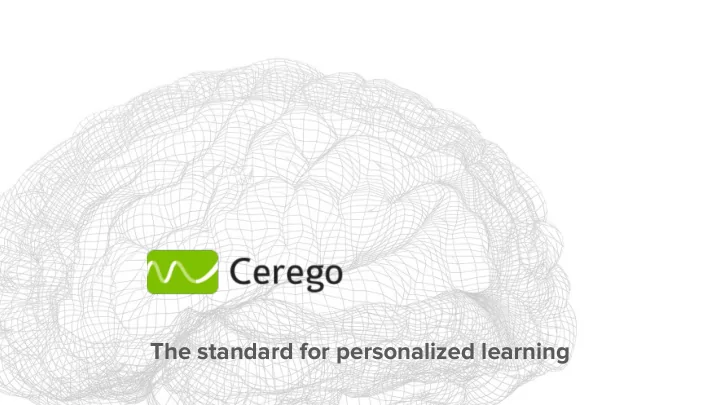

The standard for personalized learning
We focus on the “how” in learning We want to help learners study more efficiently so they can reap measureable knowledge gains.* We provide insights into learner diligence, knowledge and agility that can guide learners in achieving their potential. *86% of students surveyed in courses across the U.S. said they’d recommend their professor continue using us, and would recommend us to other students.
You will forget 80% of this presentation In 1885, Hans Ebbinghaus charted the rate of memory decay in a forgetting curve. Research on the forgetting curve shows you’ll forget 80% of this presentation after 30 days.
Cerego rectifies this In contrast, you’ll remember 80% of what you reviewed for 30 days after 4 short micro study sessions with Cerego.
Aligning study practice with learning science Distributed Practice: study is broken up into short sessions, and spaced out over time. Adaptive Practice: timing and content of study is tailored to individual user need. Retrieval Practice: learning is done through testing and real-world scenarios; activities proven to aid learning.* *We call our system DARPA, or “Distributed Adaptive Retrieval Practice Algorithm.”
Distributed learning: the remedy for ‘cerebral necrosis’ There’s a term we use for information overload: “presentation induced cerebral necrosis.” This is also sometimes called “death by PowerPoint.” Learning dividends are greater when study is distributed over time (spacing effect) . Shorter, focused ‘micro-sessions,’ are more effective than longer ones.
In contrast, “cramming” does not work Cramming might work for a train in Japan, but it’s not going to work to train your brain. Distributed learning is the better practice to encourage for long term retention. The opposite of distributed practice is ‘mass practice,’ better known as ‘cramming.’ Lack of preparation and cramming go together and likely correlate highly to test anxiety as well.* *Our system does not allow for cramming
Retrieval practice and the “testing effect” When students quiz themselves, they make gains in learning they can’t achieve through rereading alone. This phenomena is called the ‘testing effect.’ Testing activity when applied to study is called “retrieval practice.” When compared to other forms of study, retrieval practice has been shown to be more effective than other forms of study.
Reviewing at the right time: when forgetting benefits learning Reviewing when recall is difficult because memory has faded encourages deeper processing of information. UCLA learning science researcher Robert Bjork calls this “desirable difficulty.”
Why mobile learning is integral Convenience - anytime, anywhere Format - well suited to short sessions Notifications - to study at right time* *Learners working with Cerego completed twice the reviews over those who used desktop alone, and, adhered more closely to the recommended time of study.
Benjamin Bloom’s “Sigma 2” When you give students extra time to master material and also provide tutoring you get a predictable “2 Sigma” boost in outcomes. Q: That’s great - but how do you scale it? A: With adaptive learning* *We uniquely combine adaptive learning with an individuated reminders. Half a million students around the world use us.
Is Cerego an accurate predictor of outcomes? Learners using Cerego in Economics at University of Hawaii Manoa got a 12% boost in grades and 16% boost in analytic questions from using Cerego. Learners using Cerego in Organic Chemistry got a 7% boost in grades and did 21% better on analytic questions using Cerego.* *but as of yet, no institution has tried using Cerego to replace exams
Results Used Cerego for Dental Board Exam prep in 2015 Bumped pass rate up from 80% to 100% for an average performance 2.6 standard deviations above the national average. Additionally, 50 instructional hours were saved* *What could you and your instructors do creatively with these 50 extra hours?
Tests are a source of stress and anxiety for students Test results can be impacted by: Lack of preparation: 55% of US students say they don’t feel prepared for college Anxiety: 40% of students experience test anxiety. 28% worry about their academic performance Lack of preparation and anxiety have a negative impact on test performance
Tests are a ‘snapshot’ in time But Cerego builds an accurate portrayal of the knowledge a learner builds over time. This includes retention levels. How would an accurate measure of learner knowledge gains change teaching and learning at your school?
Recommend
More recommend